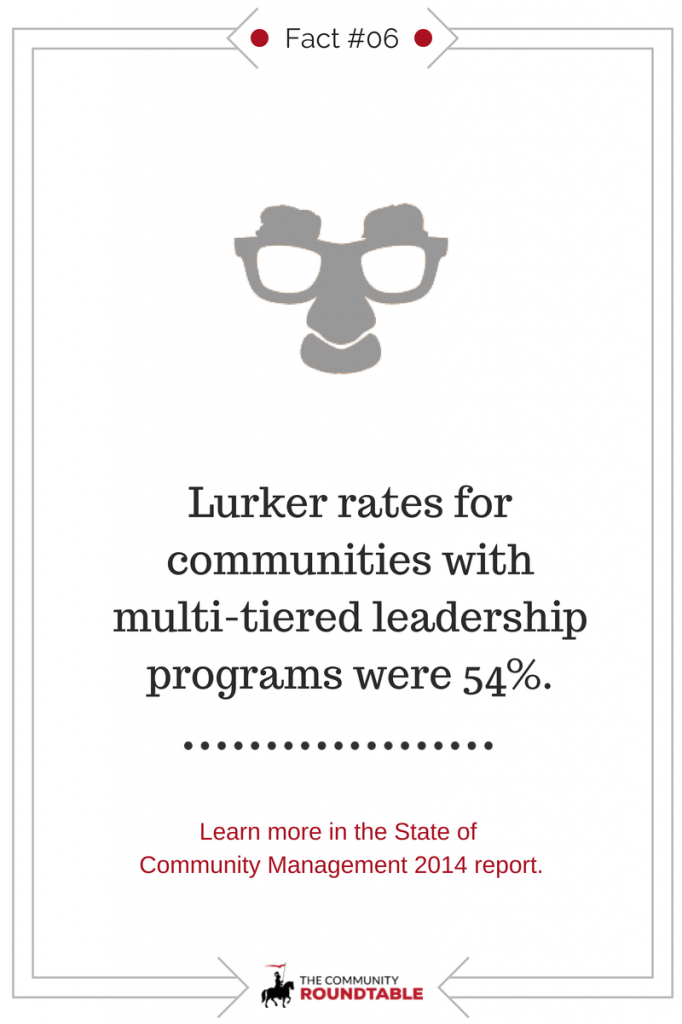By Georgina Cannie, Community Manager at The Community Roundtable
“Cuz’ the Lurkers gonna lurk, lurk, lurk, lurk, lurk…”

Amazing body painting by Cecilia Paredes.
Maybe I would write the rest of this T Swift parody song if I wasn’t so busy finding ways to engage the lurkers in my community (and if there were more words that rhymed with “lurkers”). But why do Lurkers lurk, and what can you do about it as a community manager? Hint: writing a cover song won’t help.
Here are my top five observations and work-arounds for Lurking behavior.
1.) Newbies Lurk to Adjust
Brand new community members tend to lurk quietly while they learn the cultural codes of the community. They will often refuse to participate until they have gathered a base of ‘social capital’. What to do about it: Don’t stress too much about it. 1 to 2 weeks of this behavior is perfectly acceptable. To support newbie lurkers, be sure that you have community champions who regularly model ideal participation behavior. Also be sure to make your Community Guidelines easily available – these “rules of the road” are an easy way for lurkers to understand cultural codes.
2.) Lack of Support = Prime Lurking
If members continue lurking a month or more into membership, it can be a sign that they have not been supported in their community socialization. Sometimes they feel lost, left behind or ‘locked out’ of a clique. What to do about it: Everyone wants to sit at the cool kids table – offer them a spot. If you have the bandwidth, make at least two touch points with lurkers in the first month and personally invite them to join events or discussions. Alternatively, mention them directly in discussions – Ex: “Thanks for asking this question, I bet (insert Lurker name here) would know the answer”.
3.) Stage Fright + the Lurker
Everyone always says there are no stupid questions but let’s get real – there are and no one wants to ask them in front of a community crowd. A high percent of Lurkers report feeling as if they are not smart enough to add value to discussions along with anxiety of being judged for their contributions. What to do about it: Create low pressure spaces for lurkers to join in. For example, create an off-topic discussion on a Friday asking what members are doing over the weekend. No one is unqualified to discuss their own plans. This tactic allows members to practice posting in a low impact context. Need proof? Burke, Kraut, and Joyce found in a 2010 study that coaxing a member to de-lurk even once, increases their likelihood of future participation by 38%.
4.) Lack of Investment
It’s called a community for a reason – Just like in geographical communities, folks join in due to a feeling of duty and connection to other members. However if members do not feel these bonds or dependencies, they are much more likely to lurk. What to do about it: Pair Lurkers with a specific question that suits their experience. Ex: “So and So asked a question that I think you are uniquely suited to answer, can you take a look? So and so really needs your help!” Channel your inner-Mom and lay on a thin layer of subtle guilt.
5.) Fear of Rejection
…or worse, being ignored entirely. In our digital age, failing to receive comments or likes on a post is a palpable form of social rejection. If a lurker takes the plunge and posts a discussion or comment, which then goes unacknowledged, chances are they won’t take the risk again. What to do about it: Acknowledge it for goodness sake! Ideally, backchannel with other members to find a relevant responder (see example in section 4). At a minimum, respond to the post as an administrator thanking the Lurker for their contribution.
How do you combat the silent and stealthy lurker in your community? Have you found any easy ways to encourage people to step away from the community “wall” and get involved?


